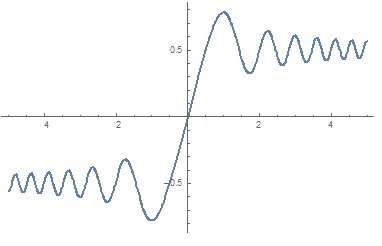How do you find the integral of #f(x)=cos^2(x^2)# using integration by parts?
1 Answer
Explanation:
I could take a stab at the solution but it involves a different approach to integration by parts.
We have:
Unfortunately:
does not have a nice solution that can be expressed in terms of elementary functions. There is however some hope, there are a pair of special functions called the Fresnel functions (which are usually covered a bit beyond beginner calculus though it has very important applications in optics) and one of them is defined as follows:
By using the taylor series of
The function looks like this:

For simplicity we will simply denote the Fresnel function as
https://en.wikipedia.org/wiki/Fresnel_integral
So using the appropriate trig identity:
Where
We can stop here or write this in terms of the power series from above:
Unfortunately, for reasons stated above, this is about as good as you can get to an integral for

